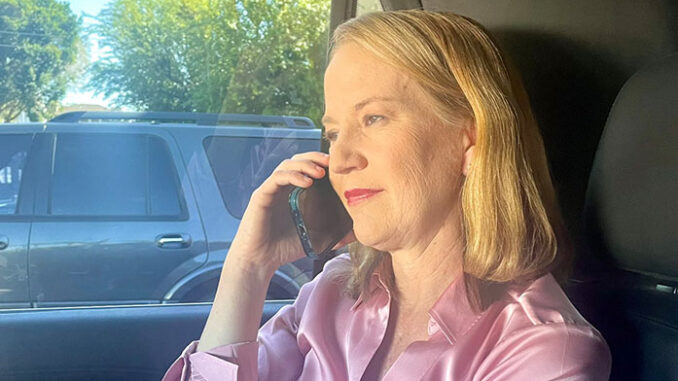
Politicians, lobbyists, and pundits reacted quickly to the Arizona Supreme Court ruling that the ban on abortion is the state’s law. In a 4-2 decision, the Court ruled that the 1864 ban on abortion will take effect in two weeks.
The Court rejected the argument that the 2022 law that bans abortion after 15 weeks is the law of the land.
Justice Lopez authored the Opinion of the Court, in which Justices Bolick, Beene, and King joined. He wrote:
The abortion issue implicates morality and public policy concerns, and invariably inspires spirited debate and engenders passionate disagreements among citizens. A policy matter of this gravity must ultimately be resolved by our citizens through the legislature or the initiative process. Today, we decline to make this weighty policy decision because such judgments are reserved for our citizens. Instead, we merely follow our limited constitutional role and duty to interpret the law as written. See Ariz. Const. art 3; Ariz. Sch. Bds. Ass’n v. State, 252 Ariz. 219, 229 ¶ 45 (2022) (“We respect the role of the legislature in the discharge of its constitutional duties . . . and we heed our constitution’s fundamental premise that the division of powers necessarily impels judicial restraint, particularly in the realm of lawmaking.”). For the reasons discussed, the legislature has demonstrated its consistent design to restrict elective abortion to the degree permitted by the Supremacy Clause and an unwavering intent since 1864 to proscribe elective abortions absent a federal constitutional right—precisely what it intended and accomplished in § 36-2322. To date, our legislature has never affirmatively created a right to, or independently authorized, elective abortion. We defer, as we are constitutionally obligated to do, to the legislature’s judgment, which is accountable to, and thus reflects, the mutable will of our citizens.
Arizona Speaker of the House Ben Toma and Senate President Warren Petersen issued a joint statement in response:
“The Supreme Court has made its decision, and it was one based solely on the text of the law – it was not a policy statement. It’s important to note that there is at least a 60-day waiting period before any change in the existing law occurs. During this time, we will be closely reviewing the court’s ruling, talking to our members, and listening to our constituents to determine the best course of action for the legislature.”
Governor Katie Hobbs called it “a dark day in Arizona,” and said “this extreme ban must be repealed immediately.”
“It is a dark day in Arizona. We are just fourteen days away from one of the most extreme abortion bans in the country. But my message to Arizona women is this: I won’t rest, and I won’t stop fighting until we have secured the right to abortion. That is my promise to you. Attorney General Kris Mayes vowed to fight decision,” tweeted Hobbs.
It is a dark day in Arizona. We are just fourteen days away from one of the most extreme abortion bans in the country.
But my message to Arizona women is this: I won't rest, and I won't stop fighting until we have secured the right to abortion.
That is my promise to you.
— Governor Katie Hobbs (@GovernorHobbs) April 9, 2024
Mayes called it “unconscionable and an affront to freedom.”
The decision made by the Arizona Supreme Court today is unconscionable and an affront to freedom. pic.twitter.com/swEqJREVVS
— AZ Attorney General Kris Mayes (@AZAGMayes) April 9, 2024
“Just a few years ago, when I voted to limit abortions to 15-Weeks (almost four months) in Arizona, I believed then, as I do now, that 15 weeks is what my district believes to be an appropriate timeline,” said Senator TJ Shope. “Outreach from my constituents confirmed that to be the case. Today’s Arizona Supreme Court decision reinstating an Arizona Territorial-era ban on all abortions from more than 150 years ago is disappointing to say the least and has ignored our legislative intent. I will immediately work with my legislative colleagues to repeal the territorial law so that the policy we placed in Statute, just two years ago, that places reasonable limitations on abortion that a majority of Arizonans support, can stand.”
Just a few years ago, when I voted to limit abortions to 15-Weeks (almost four months) in Arizona, I believed then, as I do now, that 15 weeks is what my district believes to be an appropriate timeline. Outreach from my constituents confirmed that to be the case. Today’s Arizona… pic.twitter.com/KIQ3mJBZJa
— T.J. Shope (@TJShope) April 9, 2024
According to The Center Square, “the territorial era law came back into play following the overturning of Roe v. Wade in June 2022, which brought the issue of abortion exclusively back to the states. Months before the ruling, former Republican Gov. Doug Ducey signed the 15-week policy into law.”
“I signed the 15-week law as Governor because it is thoughtful conservative policy, and an approach to this very sensitive issue that Arizonans can actually agree on,” Ducey tweeted. “The ruling today is not the outcome I would have preferred, and I call on our elected leaders to heed the will of the people and address this issue with a policy that is workable and reflective of our electorate.”
The relatively small Freedom Caucus vowed to support the total ban, but that might be enough to kill any efforts to change it, unless Democrats join with Republicans to get it done. Republicans only have a one-vote majority in each house of the legislature.
I signed the 15-week law as Governor because it is thoughtful conservative policy, and an approach to this very sensitive issue that Arizonans can actually agree on. The ruling today is not the outcome I would have preferred, and I call on our elected leaders to heed the will of… https://t.co/h7n5bmYnrU
— Doug Ducey (@DougDucey) April 9, 2024
